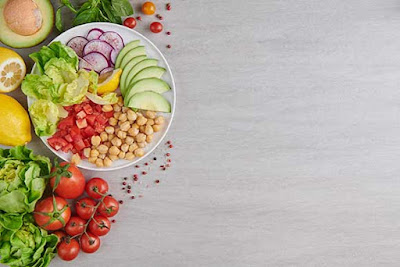Every meal you eat and every drink you have comes into direct contact with your teeth, which means that the choices you make can have a huge and direct impact on your dental health and teeth. Foods and drinks that many of us include within our diets - processed, sugary, and acidic foods and drinks - can actually damage your tooth enamel, which can then lead to tooth decay and cavities in the future. Eating healthily not only helps your overall health, but also your dental health.
Tooth decay happens when sugar reacts with the bacteria that creates plaque. This then creates acid, which damages your teeth and destroys the enamel and after this happens repeatedly, your tooth enamel can break down. This then causes holes, or cavities, to form in the dentine of your tooth. Once this happens, tooth decay can happen really quickly. What you eat also affects other aspects of your overall dental health and can lead to bad breath, plaque build-up, and yellowing or staining of your teeth. With this in mind, here are some ways that how what you eat can have an impact on your teeth and dental health.
#1 Skip the sweets
Cavities and tooth decay have long been linked with sugary and sticky foods, as well as poor dental health habits. Whilst you don’t need to completely cut out sugar from your diet (your body still needs sugar to function correctly and keep your blood sugar levels at optimum levels) if your diet is heavy in sugary and sweet foods, then reducing your intake of these foods is important. This means foods such as sweets, chocolate, fizzy drinks, and even fruit juices.
#2 Look Out For Hidden Sugars
You may also be surprised to find that sugar is often hidden in foods such as cereal and jars of sauces and condiments. Even foods you might consider to be healthy, such as bottled smoothies, fruit juices, and tinned fruits, can have high sugar levels, so it is important to check the sugar content in the foods you eat and drinks.
#3 Try to avoid sticky foods
Whilst sticky foods such as honey and raisins are typically healthy foods these, along with starchy foods such as crisps and white bread, can stick to the surface of your teeth and further increase the risk of developing cavities. Whilst you don’t need to avoid these foods, it’s best to eat them in moderation and follow good dental practices, such as flossing and brushing, so that the sticky residue isn’t left behind and can reduce the risk of damage to your teeth.
#4 Beware of Teeth-Staining Drinks
Certain drinks are more likely to stain your teeth than others. This is because they contain color pigments, known as chromogens, which stick to teeth and stain tooth enamel. Drinks are the biggest culprits, with certain drinks such as red wine, coffee, and tea causing the most damage. This doesn’t mean that you can’t enjoy a cup of coffee in the morning or a glass of wine with dinner, but be sure to drink plenty of water alongside so that it washes away any remaining tooth-staining residue and properties.
#5 Drink Plenty of Water
You should also avoid drinking these types of drinks in-between meals, and stick to drinks such as water during the day. Diluted and sugar-free fruit juice is another option, as there will be little damaging residue left behind afterward. Fizzy drinks can also increase the risk of developing dental health problems, as the sugar and acid in both regular and diet fizzy drinks can cause tooth decay and dissolved the enamel coating of your teeth. The risk of these issues developing is higher when you have these drinks in-between meal times.
#6 Avoid Brushing Your Teeth After Eating
It is really important that you brush your teeth twice a day - once last thing at night and another at least once during the day - with fluoride toothpaste. Eating and drinking foods with damaging sugars and acids can weaken the enamel on your teeth and if you brush your teeth straight after eating and drinking, then you can cause some of these tiny particles of enamel to be brushed away. Typically, you should wait around an hour after eating to brush your teeth.
#7 Eat A Healthy Diet
Eating a healthy and balanced diet is not just important for your physical health and wellbeing, but also your dental health. A diet that is rich in fresh fruit and vegetables, vitamins, and minerals can help to prevent issues such as gum disease, gingivitis, and tooth decay. Natural foods such as raw crudites, nuts, and seeds are good for teeth because they’re crunchy and help to remove plaque or food build-up in between teeth - they’re also good snack substitutes!
#8 Use Chewing Gum
Chewing gum is good to have after mealtimes as it helps your mouth to produce more saliva, which then works by canceling out the acids in your mouth after eating and drinking. It has been found that chewing sugar-free chewing gum after mealtimes can prevent tooth decay and plaque build-up, but it is important to only use sugar-free chewing gum as ordinary gum contains sugar which may only damage teeth further.
#9 Check Food Labels
All sugars can cause tooth decay and dental damage, and sugar comes in many different forms. Usually, you can identify ingredients that are sugar by looking for words ending in “ose”, as these are sugars and can come in the form of sucrose, fructose, and glucose - all words for sugar.
Many processed and junk foods contain sugar and, the higher up it appears in the list of ingredients, the higher the levels of sugar in the product. Try to look at food labels and spot where sugar might be the main ingredient. It’s important to remember that “no added sugar” doesn’t mean that it is sugar-free. It just means that no extra sugar has been added to the recipe.
#10 Limit Your Intake Of Acidic Foods
Just like sugary foods, acidic foods can cause a lot of damage to your teeth too. Whilst we are naturally more averse to acidic foods, many of us include them within our daily diets. Foods such as oranges, grapefruits, and lemons are all unsurprisingly acidic, but did you know that cranberries, gherkins, pickles, and tomato-based products (salsa, hot sauce, ketchup) are also known for their low pH levels?
Acidic foods cause issues as they can discolor your teeth and make changes to your enamel, this then leaves the inner part of your tooth enamel known as dentin exposed, which then makes you more prone to sensitivity. As with sugary foods, try to limit your intake and avoid brushing your teeth soon after eating acidic foods, as you will only cause further damage.
Conclusion
It’s important to remember that the foods and drinks you consume can have direct effects on your teeth and overall dental health. Sugary foods can be the most damaging to your teeth and contribute to issues such as decay and cavities, which then, in turn, lead to longer-lasting issues that may need addressing by your dentist in London or
orthodontist Warrington based with treatments such as fillings or all on 4 dental implants, in the more serious cases. Eating healthy foods and drinking plenty of water is not only good for your overall health and wellbeing, but your teeth and oral health will benefit massively too.












No comments:
Ask your question here